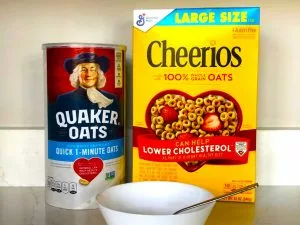
For years, the big cereal companies have been telling us that a bowl of whole grain oat cereal for breakfast is a healthy way to start our day. Turns out maybe it isn’t.
A recent study by the Environmental Working Group (EWG) has uncovered a toxic chemical, chlormequat, in popular oat cereals like Cheerios and Quaker Oats.
Chlormequat should not be in our food supply. It is an agricultural chemical used to limit plant growth, making a plant sturdier and easier to harvest. In the U.S., the chemical is banned from being used on any food crops. However, the Environmental Protection Agency (EPA) inexplicably decided in 2018 to allow foods grown with chlormequat to be imported into the United States.
This makes absolutely no sense. If chlormequat is too dangerous to use on food grown here, why is it less dangerous on food grown elsewhere? Past studies have linked chlormequat to reproductive and developmental harm in animals. More specifically, the studies have linked the chemical to reduced fertility, altered fetal growth, and delayed puberty.
Unfortunately, the EPA’s misguided chlormequat policy has already had an effect on the American public. According to another EWG study, chlormequat has been detected in the majority of Americans tested, with detection rates rising steadily since 2018. In 2017, chlormequat was detected in only 69% of EWG’s study participants; by 2023 it was detected in 80% of participants. Considering how long the chemical stays in the body (24 hours), these findings suggest that Americans are being exposed to chlormequat on a regular basis.
One source of chlormequat exposure appears to be the food we are eating. EWG’s recent testing uncovered pervasive levels of chlormequat in oat-based foods, particularly in nonorganic products. Detectable levels of chlormequat were found in 13 out of 14 of the nonorganic oat-based cereals, oatmeal, granola, and granola bars tested, compared to only 1 out of 7 of the organic products tested. Even more concerning, eleven of the nonorganic products contained chlormequat at levels higher than the amount considered safe for children. This research raises concerns about the widespread presence of this potentially dangerous chemical in our food supply.
However, instead of showing concern about these findings and taking a step back to study the human health effects of chlormequat, the EPA is now proposing that we allow U.S. farmers to use chlormequat on oats and other grains grown here in the U.S.
Why?
Possibly because the agency has a history of caving in to pressure from the chemical industry. In 2017, Taminco, a major producer of chlormequat, petitioned the EPA to permit the chemical in oats imported into the U.S. In response, the EPA agreed to tolerate a certain amount of chlormequat in imported foods. After another petition from Taminco in 2020, the EPA increased that tolerance. Now, the company has submitted an application to the EPA to allow chlormequat to be used on oats and other grains grown in the U.S.
It seems that whatever Taminco wants, Taminco gets. No matter the consequences for the American people.
Agencies like the EPA are supposed to prioritize the protection of public health over the approval of potentially harmful chemicals. Safeguarding consumers from toxic substances like chlormequat is part of the mission of the EPA. Instead, they appear to be protecting the interests of industry.
We urge the EPA to change course and conduct a thorough investigation of the health effects of chlormequat before greenlighting the use of this potentially dangerous chemical in our food supply.
Until the US EPA decides to do its job, we recommend you choose organic oat products that are free from toxic chemicals like chlormequat.
The Collins Law Firm has been representing plaintiffs in toxic tort claims, class actions, and other environmental lawsuits against big polluters for over 20 years. If your health has been harmed by toxic chemical exposure, give our tough, experienced, environmental attorneys a call at (630) 527-1595.

"*" indicates required fields